George Fox and the Birth of Quakerism
In the mid-1600s, an unusual guy named George Fox became disillusioned with the Church of England, and he set out on a journey to uncover spiritual truths for himself. Known for wearing leather breeches and sporting a shaggy hairdo, his unusual methods led to the birth of Quakerism — a faith without hierarchy, creed, or ritual.
On this episode, we explore who George Fox really was and ask, and what modern Friends make of Fox’s story.
Subscribe so you don’t miss an episode!
Want to contribute to upcoming show? Leave us a voicemail at 215-278-9411 and let us know what the word “Quaker” means to you.
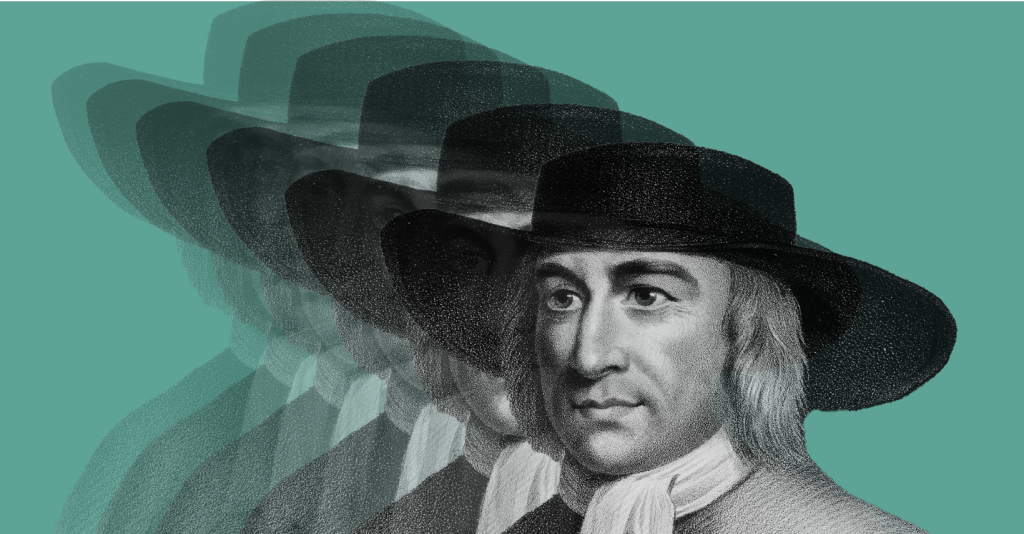
There’s much more to George Fox than we could ever cover in one episode.
Here is a list of books and resources:
- First Among Friends: George Fox and the Creation of Quakerism by H. Larry Ingle
- Learn more about Experiment with Light, a practice based on the writings of early friends and founded by today’s guest Rex Ambler.
- Rex also published Truth of the Heart: An Anthology of George Fox
- Go the source and read the original writings of George Fox (available as an open source document).
- The Story of George Fox: Founder of The Religious Society of Friends, or Quakers by Rufus M. Jones is another favorite among George Fox scholars.
- Jon’s song about George Fox: You Are Pulling Down the Pillars of the World, George Fox
Is George Fox a figure that looms large in your imagination?
Would Quakerism exist without him?
Share your thoughts below!
Max Carter
Well, yeah, he was a little nutty. I mean, you don’t take your sandals off and wander through snow crying, “Woe to you, bloody city of Lichfield,” you know, for hours on end, without being a little teched.
Georgia Sparling
That’s our good friend and Quaker historian Max Carter. Max is talking about George Fox, who is regarded as either the founder of Quakerism, or one of its founders, depending on who you talk to. In any case, Fox is a larger than life figure, a guy about whom songs have been written, who built a religion that by the time of his death had spread to multiple continents and had some 100,000 adherence, yet he hardly had any education. He was jailed repeatedly, and he was a strange guy.
Georgia Sparling
For example, at one point in his life, he was convinced that he could achieve perfection, as in before Adam and Eve ate the forbidden fruit. centuries have passed since George Fox walked the earth, but the ideals he set forth in Quakerism are still foundational to the religious Society of Friends. For a faith tradition that doesn’t honor Creed’s or hold up anyone as a hero. Is Fox his legacy even important? And do we know the real facts at all? Today we’re going to uncover who the man behind the religious Society of Friends actually was.
Various
This is Thee TheeTheeThee Thee Quaker Podcast: story, spirit, sound.
Georgia Sparling
I’m Georgia Sparling.
Jon Watts
And I’m Jon watts.
Georgia Sparling
So today, we’re gonna talk about George Fox. I really wanted to understand more about him, like his determination to discover spiritual truths, his bouts with depression, and also speculating about why he did some of the very unusual things that he did. But you’ve known about Fox a lot longer than I have. So like, what’s something about him that stands out to you? Oh, yeah,
Jon Watts
Great question. I would say probably his shaggy, shaggy locks. Or, or maybe his very fragrant socks, depending on which summer camp you went to.
Georgia Sparling
I’m hoping this is gearing up to a song that well,
Jon Watts
Of course, I’m referencing the George Fox song, which I grew up singing at summer camp with all the other Quaker kids around a campfire.
Georgia Sparling
So now you’re gonna sing it for us. Oh, see?
Jon Watts
I wasn’t really planning on that. But yeah, hold on a second. Yeah. I’ll just sing the chorus here.
Jon Watts
(singing) Walk in the light, wherever you may be walking the line, wherever you may be with my old leather britches and my shaggy shaggy locks. I am walking in the glory of the light, said Fox. George Fox.
Georgia Sparling
Well, on that note, what do you say we jump into the episode?
Jon Watts
Can’t wait to hear it. All right.
Rex Ambler
Okay, I’m Rex Ambler. And I live in the north of England in the Lake District, not far from where the whole Quaker movement started 300 years ago. And for the last 20 odd years I’ve been writing, and traveling and doing workshops on Quaker faith and practice.
Georgia Sparling
Rex Ambler has published several books on Quakerism, including truth of the heart and anthology of George Fox. He also created experiment with light, a process of meditation based on Fox’s writing.
Rex Ambler
I became a Quaker, Georgia, about 40 years ago, and I had had quite a long search before I got there. You know, I was a fairly orthodox Christian when I was young, and then went to university to study it, and then teach it at a university. But I became increasingly dissatisfied, because there was a feeling of it not being entirely real, you know, what I was hearing preached, what was happening in the church and the ritual didn’t seem to match my experience of the world. And I began to see this as had something to do with the fact that these ideas had been worked up so as to make Christianity presentable and understandable, and believable, and indeed, enforceable. And that worried me.
Georgia Sparling
Rex gave up on Christianity entirely for a while. He looked into humanism, Hinduism and other faith practices. But then he found George Fox’s writings.
Rex Ambler
And I found that Fox was saying something extremely new and relevant to me. And that is the reason you do not find this real. This what you’re hearing in the church is you’re believing that stuff out there. You’re looking outside of yourself to somebody else’s words or presentations, to find them. reality but the reality is about you ultimately, that you can only find that but looking into yourself, you can’t do with your own thoughts. Your own ideas, you got to in fact stop all that stop the talking, stop the thinking and go silent and still, and better if you can do it with others.
Georgia Sparling
Rex’s spiritual journey of rejecting the established church in some ways, mirrors Fox’s own. Fox was born in 1624 to a normal family in the middle of England. They were common folk, members of the Church of England at church that Fox began to question early in his life. And he wasn’t alone. groups had already begun to form all over the country, demanding economic, political and religious reform.
Max Carter
All were seeking a better society in which people had equal rights or at least better rights than they had been granted. And all of that was percolating during Fox’s youth and came to a head during his period in the 1640s have a special spiritual dark night of the soul.
Georgia Sparling
A long walk across the country wasn’t exactly a weird thing for religious seekers to do at the time. Max says that in many ways, Fox’s pilgrimage also aligns with the rise of many other religious leaders throughout history. Fox’s own epic pilgrimage was
Max Carter
marked by deep despondency, deep depression, fits and starts, blind alleys.
Georgia Sparling
Along the way, he did have some revelations or openings,
Max Carter
like he shouldn’t take his hat off to those above him, displaying hat honor to those socially superior to him supposedly, that he was not called to worship in temples made by hands, that the church was not buildings.
Georgia Sparling
But just when he thinks he’s making some progress, Fox gets knocked down again. In his journal, he talks about getting this enlightened spiritual advice from someone only to have that same person fly into a rage when he accidentally stepped on their flower garden.
Max Carter
People who would give him advice like if you smoked more tobacco you might achieve enlightenment. If you if you let your blood, apply some leeches, all kinds of advice, none of which quite did it.
Georgia Sparling
This is not what Fox had left the church for. He wanted something life transforming. It 1647 At this point, Fox is in his early 20s. And he would often make it a practice to sit in a hollow tree reading the Bible for days and concerning his family,
Max Carter
and not finding that that spoke to his condition. Even though it was said to Fox that should all the copies of the Bibles in the world be lost. It could be recreated from his own memory. But he found it dry words, he hadn’t gotten that inward experience that convinced him he’d found the truth, that then a breakthrough. He had an inward experience an inward voice that told him there’s one even Christ Jesus who can speak to thy condition. And when I heard it, my heart did leap for joy. Now, in today’s terms, what that probably meant was that what he had been seeking outside of himself, in other people’s experiences, other people’s knowledge, he found in himself as that light he later on talked about the inward light that John’s Gospel talks about, he found as a real presence of Christ within him a bread of life, spiritually, and that’s what transformed him from that hero’s journey. If Quakers had heroes, the hero the Quaker faith.
Georgia Sparling
Armed with this fresh insight, Fox immediately hits the road to tell other people, Hey, you don’t need organized religion. You don’t need the Church of England. Everything you need is already within you. That’s a paraphrase.
Max Carter
What Fox preached was, you can have the same experience. You too, can turn to that light within you, too, can turn to that inward Christ and be led by that teacher, Prophet, Priest King inwardly. So he kept wandering, kept walking about that, sharing that message, not overly successfully.
Georgia Sparling
By the early 1650s, some four or five years after his big opening under the tree, Fox’s assertion that you could divorce God from the church had only attracted a few people. But he had managed to get the attention of the powers that be.
Max Carter
It upset the officials. Because this is no way to, to have a successful church with ties, paying parishioners, if you got people out and about so you don’t need all of that. So the established church and the political officials because the church and the state were in bed together, needed to put a stop to this, he had enough attention that he was brought before a judge and accused of blasphemy.
Georgia Sparling
Fox is sentenced to prison and the judge tells him
Max Carter
“You must tremble and Quake before the authority of this court,” at which George Fox sais, “No it’s thou, O judge, who must tremble and Quake before the authority of the Almighty God,” which is where we get our name, Quakers. And then the judge says, “Art thou some sort of a Quaker?” meaning enthusiast, crazy person. And Fox said, “Yeah, I’m a Quaker. I quake before the God I quake in the Spirit.” And off to jail. He goes, and these are not Martha Stewart conditions.
Georgia Sparling
By this point, the civil war is raging in England. And the people who accused Fox of blasphemy are now giving him a get out of jail free card. But there’s a catch. They recognize Fox’s charisma, and they want him to lead a militia. Fox says absolutely not. Well, actually, he says this,
Max Carter
“Because I live in the virtue of that life and power which takes away the occasion for all war.” It was rooted in his own experience, but also in his understanding, having read the scriptures pretty carefully, that this is not the way of Christ.
Georgia Sparling
Here we see the beginnings of the Quaker peace, testimony and commitment to non violence. For Fox, it cost him several more months in jail. But in the spring of 1652, he’s released and this is where things start to get more interesting.
Max Carter
This is when you get to the period where he finally find some followers.
Georgia Sparling
So Fox travels north putting distance between himself and the seeds of governmental and religious power, and whether knowingly or unknowingly, he heads to a region where other nonconformists have retreated. Fox eventually makes his way to Pendle Hill, which is so big that it’s almost a mountain.
Max Carter
and he is moved of the Lord to climb it. Now, this too, is really bizarre. This is pre “Let’s go out for a nice hike and climb hills”-era. Into the 1800s people in England feared the wilderness. It looked like the world before God created order out of chaos. But it was also a center of witchcraft that somewhat ominous and on top he has a vision of a great people to be gathered. And that inspires him to continue his journey.
Georgia Sparling
Arriving at Furbank Fell, Fox finds a chapel of nonconformists, and he waits for them to emerge.
Max Carter
And he speaks for three hours, to a group of about 1000 people who gathered in the middle of nowhere. Even today, it’s the middle of nowhere.
Georgia Sparling
Imagine this unusual scene, Fox is standing on this huge hill talking to a multitude of people
Rex Ambler
Imagine an open air address without speakers, to 1000 people in a very tenant stream intelligent communicative of the big man with a big voice. Big dark eyes round eyes, you can see that in a couple of the portraits that have survived, it must have been an impressive person to speak and he obviously had a huge voice. He also had long curly hair, which most people didn’t do that time and a big leather hat and other britches so it must have been a very striking figure.
Georgia Sparling
Fpx spoken language that common people understood. And he spoke with authority.
Rex Ambler
You couldn’t disagree with George Fox. It wouldn’t be comfortable at all. I’d like to have met him though.
Georgia Sparling
It’s been seven or eight years since Fox first set out on his journey of spiritual discovery. And now he’s finally got an audience.
Max Carter
A bunch of them get convinced 60, 70, 80 of them. They become known as the valiant 60, but they couldn’t count back then. And that’s what took off. And that’s why 1652 is often given as the birth date for Quakerism
Georgia Sparling
Fox keeps preaching, but the valiant 60 head out into literally all over the world. After the break, Fox finds a wife, and we ask, should anyone even care about George Fox today?
Georgia Sparling
Welcome back, so we left Fox traveling the British countryside. But he wasn’t the only one sharing the message of this primitive form of Christianity, the valiant 60 were traveling all over the country to and not only that, but around the world. And that includes a number of women.
Max Carter
They weren’t trying to convert the heathen, they were trying to get Christians to be real Christians, primitive Christianity restored.
Georgia Sparling
Early Quakers went to Italy, the Ottoman Empire and the Caribbean. And they were particularly successful in the United States. Within only a few decades, half of the original American colonies would be governed by Quakers.
Max Carter
So the word spread quickly. And was the kind of message that people living under an oppressive authority of state and church took to you don’t need those authorities. You are equal before God in a time of Calvinism, when only the elect made it, and there was no way of knowing whether you were in the elect. Here’s this message of Quakerism that everyone can make it. And you don’t even have to know the name of Jesus to make it because that light is within you.
Georgia Sparling
And Quakerism actually gave women a voice. Later on, of course, some tried to subdue the influence of women. But at the start, women could be ministers just like men, they could travel the world spreading this message, just like men, they can also get thrown in prison for heresy, just like men, and that includes Margaret Feld, who was hugely influential in the movement, and is often called the mother of Quakerism. Fell was a wealthy woman, I became convinced in 1652 after hearing George Fox.
Max Carter
She was a key element in the organization of friends in the explanation of friends into theology and practice of friends, and was able to offer a critique of friends as well.
Georgia Sparling
Fell’s writing made a great impact on the Quaker movement. She is credited with penning the first public declaration of the Quaker stance on peace, which was sent to King Charles the second.
Max Carter
Her essay women speaking justified is an amazing tract of biblical exegesis. That could pass yo as a thesis in most seminaries today, 300 years before there were Quaker seminaries. And she was quite an organizer, I think. Much of the genius of the early Quaker organization was was her doing, she collected money and made it available to these valiant 60. And the Quaker missionaries heading out of correspondence came in to Swarthmore Hall and went out from Swarthmore Hall,
Georgia Sparling
which was Fell’s home with her husband
Max Carter
That was the Grand Central Station, she organized that. Fox was not the organizing genius.
Georgia Sparling
The two clearly had a strong friendship, and in 1669, they became husband and wife. Fell had become a widower more than a decade before. At the time of their marriage. Fox was in his mid 40s. Both were in and out of jail during their marriage, and they constantly traveled for the sake of Quakerism. Fox even spent two years traveling to the Caribbean and North America while his wife remained in England.
Max Carter
There are some who feel that it was a marriage of convenience. But if you read their correspondence with each other, they truly love each other.
Georgia Sparling
Often what Quakers know about Fox is summed up in that song that Jon sang or earlier, it’s a kind of greatest hits of Fox’s life.
Max Carter
It presents him as kind of a warm, fuzzy guy, you know, walking cheerfully over there things leather riches, you know, and no more complicated than that.
Jon Watts
(singing) There’s a light that is shining in the dark. And it’s you, there’s a light that is shining friend in me and in you walk in,
Max Carter
but there’s a reductionist tendency with our religious founders and leaders, and they’re far more complex than that. Yeah, the George Fox song is fine, if you are able to move beyond that and understand the more complex understanding of who he was. And that his journal was severely edited, cleaned up, and he was made to appear more normal, perhaps than then he was, although, you know, he too, like like anyone kind of settles down, chills out to their life and aren’t quite the way they were when they were that wild haired early 20s person.
Jon Watts
(singing continuited) will fight for the Lord. But you can’t kill the devil with a gun or a sword. Will you swear on the Bible? I will not
Georgia Sparling
But what about today? Should Fox be lauded and celebrated? What should we think about him?
John Muhanji
That was a great sacred man of God. That was one person that was fully inspired and filled with the Holy Spirit.
Georgia Sparling
That’s John Muhanji, the African ministries director of Friends United Meeting, based in Kisumu, Kenya.
John Muhanji
George Fox is one of the people that we would say, I’ve respected in the rest of my life, and is the one that really made me to really be a Quaker and make me feel proud to be a Quaker because of him. And his, and his quest to see the world being a fair world. And it was all scriptural. It wasn’t something that was just coming from his thinking. So as far as I’m concerned, that is the I wish we had a similar judge folks like him today. I wish I would have been like him myself.
Georgia Sparling
So Quakers today had different opinions about Fox. And I’m going to bring Jon back to talk about this for a second.
Jon Watts
Yeah, I knew this topic was coming up on the podcast. So I asked a few people about it while I was on a recent trip to Portland, Oregon.
Georgia Sparling
And what did you ask them about?
Jon Watts
I just wanted to know if they think about George Fox, like, is he still a relevant figure in Quaker spiritual lives? The first person that I spoke with was Damon mots story.
Damon Motz-Storey
I don’t think of George Fox very often. In part, because one of the things I’ve always treasured about how Quakerism was taught to me as a kid and as an adult, is that we are all ministers. It’s not that there are no ministers in Quakerism. It’s just that everyone is has that capacity to, to speak the truth that God or the divine or whatever word you use, for it is speaking. For that reason, George Fox, to me, is on a similar page as many other sort of inspirational inspirational figures. But like he’s just a person who was sort of in the right time in the right place to sort of shake things up a little bit.
Georgia Sparling
Damon isn’t convinced that Quaker ism exists solely because of the likes of people like George Fox and Margaret Fell.
Damon Motz-Storey
I think there’s also sort of like, another way of looking at it, which was that like, spirit was calling for this movement of people to emerge. And those happen to be the people who listened to and responded to the call, right? That’s another way of looking at it. That I think sort of focuses instead on that macro level of like the the religion itself has now been around for hundreds of years, and is continually always remaking itself.
Georgia Sparling
Mark Pratt-Russum is a Quaker pastor at West Hills Friends Church near Portland, Oregon, and he has a different take on George Fox. But he admits
Mark Pratt-Russum
It always makes me nervous to talk about George Fox because it comes across as a little culty. I think sometimes people like oh, like you follow in the teachings of George Fox and wait isn’t supposed to be Jesus.
Georgia Sparling
Mark says he’s always been struck by how Fox perceived and identified the spiritual lack in his culture, and how he bravely responded to them.
Mark Pratt-Russum
And so, you know, the origins of Quakerism I love that it has this disruptive, you know, route to it were, you know, brave enough to say, you know, these systems of doing church are inherently oppressive and getting in the way of normal people’s abilities to interact with the divine. So let’s do something else. You know, it just seemed like George came, came into his identity at the perfect time. Quakerism kind of was a response to what was being what was happening in a culture. And it just so happened that the methods in which they used to push back against that culture, which was not hiring ministers, and this is in sitting in silence and recognizing the authority of all people. Like we live in that legacy. And it’s still relevant today. Right. And so, I love kind of talking about that, rather than necessarily where people want to start about like pacifism, and whatnot. I think that there’s a spark there that we still live in.
Jon Watts
What an amazing note to in that story on. Thanks, Georgia.
Georgia Sparling
Yeah, well, there is one more note.
Jon Watts
Okay
Georgia Sparling
I think we should end with this song that you wrote about George Fox.
Jon Watts
Oh, wow. Awesome.
Georgia Sparling
Cool. Let’s hit it.
Jon Watts
(singing) I found George Fox living in a journal with his life documents. And I found George Fox living in a journal that is waiting to be read now good. sing his song for you. I could sing it for you sing his song for you. I could sing it for find comfort in idolatry or dogma…
Georgia Sparling
Thank you for listening. We’d love to know what you think about George Fox. Did you grow up singing George Fox songs around the campfire? Is he talked about too much? Too little? Head over to our website to share your thoughts. That’s at Quaker podcast.com. If you would like to support our work, please consider becoming a Patreon supporter. We are a brand new project and every contribution expands our capacity to tell Quaker stories in a fresh way. Visit Quaker podcast.com for more information. You can also click on that link in our show notes. This episode was produced by me Georgia Sparling and Jon watts. Jon also wrote the music for this episode, including that last track “You Are Pulling Down the Pillars of the World, George Fox. Listen to the whole song on our website. And now that you’ve heard from us, it’s time for us to hear from you. We asked a few of our listeners what the word the means to them. Here’s one of the answers we received.
Leslie Redmon
Hi, George and Jon. This is Leslie Redmond from Friendship Friends Meeting in Greensboro, North Carolina. I do use thee when communicating with friends, especially at my meeting and at home with my children. Being involved in the conservative branch of friends it’s not uncommon to hear folks using thee and I really appreciate its use and what it represents. So the values of plainness, simplicity and equality. And I also feel somewhat of a sense of responsibility to preserve Quaker history and tradition. And so the use of thee is one of those distinctive Quaker practices that I feel is really important to continue.
Georgia Sparling
Leslie, thank you so much for sharing that. And don’t forget, we want to know what the word Quaker means to you. Give us a call and leave us a voicemail at 215-278-8411. Please try and keep it to one minute, and we might just share your response on a future episode. Next week on the Quaker podcast, we’re going to take a look at the role of the internet in the lives of Quakers today.
Recorded and edited by Georgia Sparling
Original music and sound design by Jon Watts (Listen to more of Jon’s music here.)
Supported by listeners like you (thank you!!)
Thank you to Max Carter, Rex Ambler, Damon Motz-Storey, and Mark Pratt-Russum for speaking with us for this episode.
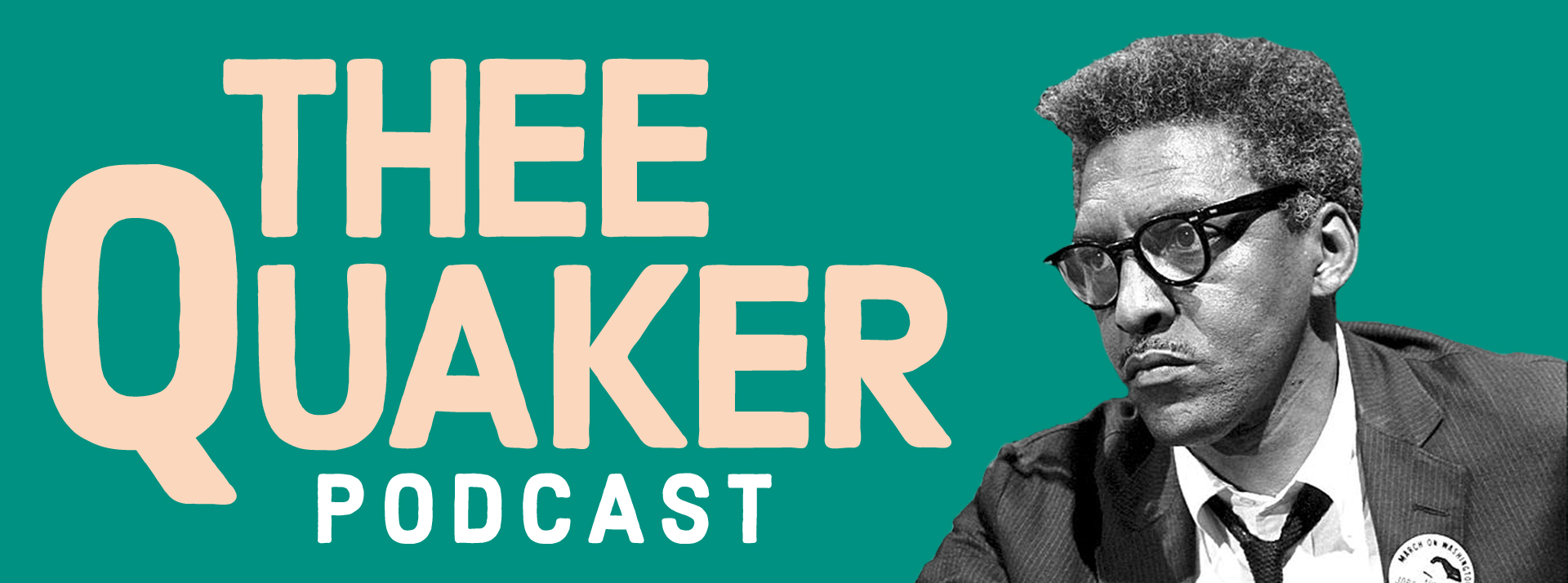

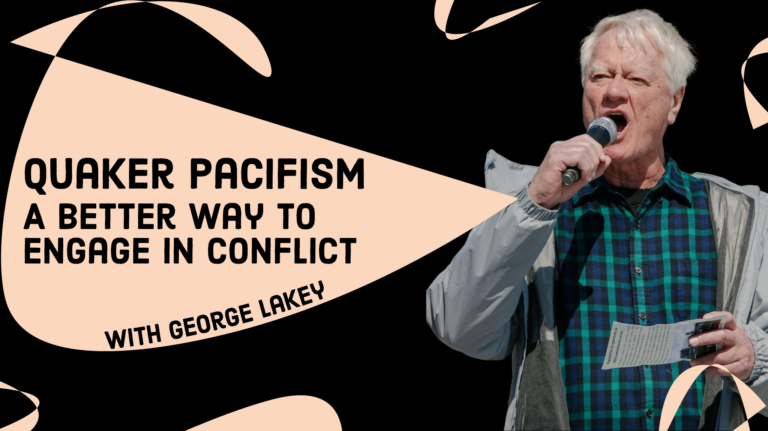
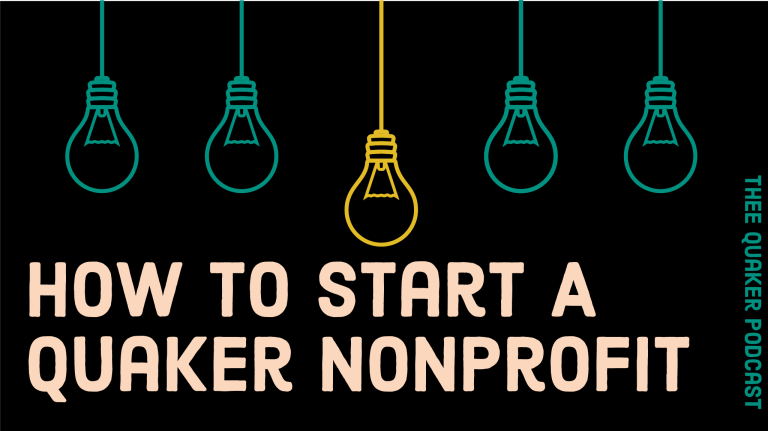
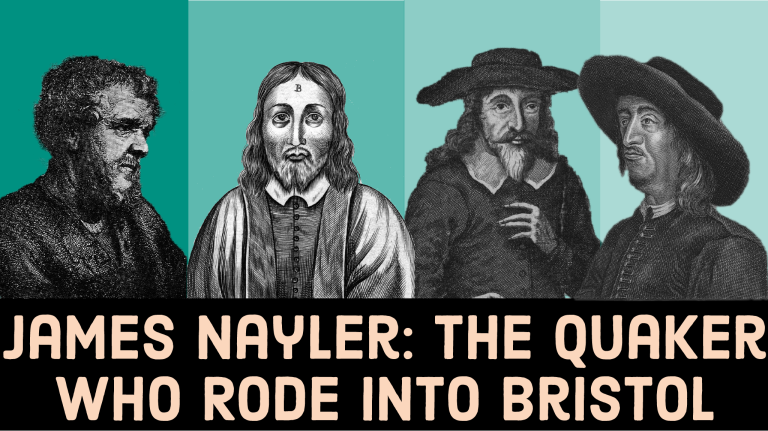


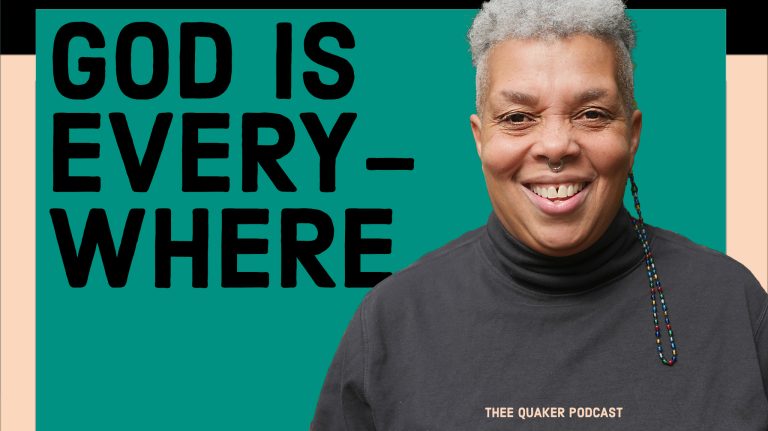
Thanks for another good podcast. Georgia did a great job of sorting through my ramblings for bits that, I hope, will be informative for “seekers.”
It would seem the Quakers have deviated from their original practical and theological stance. Most Quakers today are not Quakers and the majority of them are not Christians. They have taken a leftist turn and nothing is seemingly too radical for them. Most people are unaware that the Quakers had a significant part in the Industrial Revolution and its establishment of the capitalist free-enterprise system. Today it seemingly is more attuned to the time-proven disasters of Marxist-Leninism. If the Inner Light is a moral imperative it should be recognized in wartime. A distant relative of mine was ostracized and read out of his Meetinghouse in Florida because he served in World War II, when the very basis of our cultural, political and religious freedom was at stake. Jonathan Rumford, my fourth great-grandfather, a wealthy businessman in Wilmington, Delaware, both before, during and after the American Revolution, friend of Franklin, Caesar Rodney and commended to Washington and repaired to join him at Perth Amboy as Captain of his Delaware Battalion, was removed from his Quaker Meetinghouse for arming a ship he owned for the conflict. This is not meant to be a diatribe against Quakerism. I am well schooled in the quiet, spiritual nature of their contributions to society as a whole. I mean this in a personal sense. But it would seem, like so many other modern institutions they have drifted from their original mission, so to speak. I am fully receptive to correction if that is deemed necessary.
I am descended from John Bright, a British Quaker and mill owner (his brother ran the mill while he was a member of parliament). John Bright seemingly had no problem with child labour or poor housing for his employees and was instrumental in the Corn Laws, the precursor to Free Trade. Free Trade is entirely different under British Colonialism and today’s global economy. Like many of his class and conviction, he was anti-war and an abolitionist. He is credited with introducing cotton to India as a bulwark against cotton in the American South. The original practical stance can not be accurately judged today. What was radical then is considered conservative today. Friends remain radical. Most Friends today are in Kenya and probably hold more conservative social beliefs at the same time as more communal economic practices that would have been radical in both your and my ancestors’ time.
Thank you. I was once taken in by Quakers long ago (when i would have otherwise become homeless again), and it made an impression on me. Having become disillusioned with regard to Christianity and most religion and now practice life as an atheist humanist, i nonetheless find myself continuing to admire some common approaches to a meaningful and thoughtful life practice—amongst them secular Buddhism and Quakerism
Your informative podcast is food for thought.
There is no such thing as an atheist, though some profess this as some form of elitist group, or badge of honor. We are all seekers. From the day of our birth to the day of our death.
It was the original practice of listening to the inter-voice of God for guidance I thought. Given we are all different in your experiences it may influence what we hear and feel in meditation. I‘m confused with Russel’s statement ‘Most Quakers today are not Quakers and the majority of them are not Christians’. Are you saying one must be a Christian to be a Quaker? The whole idea of the Society of Friends is to seek the inter light and guidance of God. In some members they separate Jesus Christ from God, they may also not involve a passive attitude but in my mind they are still Quakers.
That statement was merely to point out the differences between the Society of Friends currently, and as it was in 1698 and 1678 when my ancestors brought their Certificates to the Langhorne, Pennsylvania and Crosswicks, New Jersey Meetings, respectively. You must admit that all contemporaneous religious institutions are having internal struggles over traditional theology. It brings to fore the question as to how much liberalizing any institution can impose before it is a shell of its former self. If i misrepresented you, so to speak, I apologize.
Thanks for the very informative background. I had read a bit about George Fox when I worked at a Quaker School. For me, this podcast portrays him in his complexity (as we all are) and in the context of the time and place he lived.